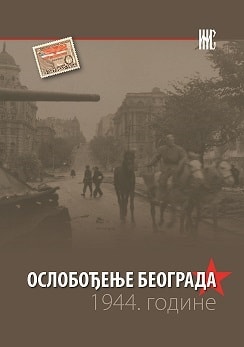Албания в политике Югославии и СССР в первые послевоенные годы по советским дипломатическим документам
Albania in the Policy of Yugoslavia and USSR During the First Post-War Years, According to Soviet Diplomatic Documents
Author(s): Anatoly Semenovich Anikeev
Subject(s): Diplomatic history, Political history, International relations/trade, WW II and following years (1940 - 1949), Geopolitics, Peace and Conflict Studies
Published by: Institut za noviju istoriju Srbije
Keywords: Yugoslav-Albanian relations; N. Spiru; Yugoslav aid to Albania; Soviet mission in Tirana; Chuvahin; Soviet-Yugoslav conflict; Stalin; Tito;
Summary/Abstract: The liberation from the Fascist occupation of a number of East European countries by the Soviet army was the first step in the process of transformation of political systems and the formation of the Soviet block. The dominant position in the Balkans was taken by the Communist Yugoslavia which strove to expand its influence in the region. In the first phase such a role of Yugoslavia tallied nicely with the interests of USSR which was willing to delegate part of its power to Yugoslavia. Albania, whose independence and territorial integrity were guaranteed by the agreement between USSR, USA and Great Britain, was in informal alliance with Yugoslavia and in the sphere of its military and political interests which, was one of the main reasons for Moscow to hand that country over to Belgrade in summer 1946 for »vicarious« administration. Having entrusted the Yugoslavs with this task, USSR took over the responsibility to supply aid to Albania, retaining at the same time the control over the execution of decision concerning foreign policy of that country. During 1946 and 1947 Yugoslavia concluded with Albania a number of treaties concerning economy and finance. It reorganized Albanian army according to the Yugoslav standards, which, to all intents, should lead to Albania becoming one of the Yugoslav republics. The Soviet leadership considered such policy realization of the agreements which had been reached, but only until the moment when, the Yugoslavs broke them – in the opinion of the Cremlin. Parallel aid from these two countries caused a clash of interests among the Albanian leaders and led to the formation of two groups, one of which started to consider the alliance with Yugoslavia a burden and to turn increasingly toward Moscow. In November 1947, under pressure from the Yugoslavs, the leader of that group, N. Spiru ended his life in suicide. This enraged Stalin who summoned Djilas to talks in Moscow. By the end of the year it became known in Cremlin that Tito intended to send an infantry division to Albania near the Greek border, which was a severe »transgression« that would endanger Soviet interests in the region. Stalin talked about that to Yugoslav leaders in February 1948 who were summoned to Moscow together with the Bulgarians to be »filled in«. The totality of these circumstances was one of the reasons for the conflict with Yugoslavia which would begin soon. In that experiment of the Cremlin Albania was held hostage by ambitions of the two Communist leaders, one of whom, having entrusted that country to Yugoslav patronage wasn't able to foresee all consequences of such a step, so he made an ultimatum to Yugoslavia at the crucial juncture. Disregarding the scale of its involvment in the events in Albania, Yugoslavia fulfilled the demands of the Cremlin, but it was forced to withdraw from Albania during the increasing conflict with USSR. Stalin's estimate that one could continue to run Yugoslavia from the Cremlin by relying on ideological instruments and economic pressure wasn't justified. For its part, Albania proved a faithful ally of Moscow until the end of the Stalin's era, together with other faithful and enraged (for reasons of their own) enemies of »Titoism«. On the whole, the episode of Yugoslav-Albanian relations which developed under Cremlin's careful auspicies during the first postwar years showed, coupled with other factors, the deeply flawed character of the policy on which Stalin tried to build his East-European empire.
Book: Ослобођење Београда 1944.
- Page Range: 469-489
- Page Count: 21
- Publication Year: 2010
- Language: Russian
- Content File-PDF

